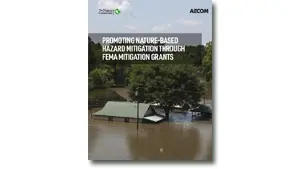 This guidance document is intended for stakeholders pursuing FEMA HMA grants for nature-based solutions to mitigate risks associated with flooding (riverine and coastal) and wildfire. Many of the HMA grant programs can fund projects that mitigate other hazards, but this document is limited in discussion to flooding and wildfire.
This guidance document is intended for stakeholders pursuing FEMA HMA grants for nature-based solutions to mitigate risks associated with flooding (riverine and coastal) and wildfire. Many of the HMA grant programs can fund projects that mitigate other hazards, but this document is limited in discussion to flooding and wildfire.
This document is designed to give users a better understanding for how HMA grants are a viable funding source for nature-based solutions to hazard mitigation. This includes an overview of selecting appropriate NBS for a given hazard and location, FEMA HMA requirements, and how to maximize benefits for a given project. Through this discussion, brief explanations of FEMA HMA funding pathways will be explored, but the discussion will not be exhaustive, as there are FEMA guidance documents that go into detail on the grant programs.
Natural hazards of flooding and wildfires pose major threats to communities across the U.S. The frequency and intensity of these hazards is also likely to increase over the coming decades due to our evolving climate. Traditionally, “gray” or “hard” infrastructure solutions—engineering projects that use concrete and steel—have dominated efforts to manage risk and mitigate hazard impacts for communities. For example, seawalls and revetments have a long history of protecting coastal infrastructure. Similarly, preferred building materials in wildfire-prone areas has transitioned from wood to stone, steel, or composites.
Although these approaches have been effective in providing site-specific hazard mitigation, the focus is shifting toward holistic solutions that have an eye towards natural processes to provide increased resilience. Combining gray infrastructure with nature-based approaches, often referred to as a hybrid approach, can also provide an effective means for hazard mitigation that results in environmental, economic, and social co-benefits.
The Federal Emergency Management Agency (FEMA) is becoming aware of nature-based solutions as viable and preferred hazard mitigation solutions and has expressed a specific interest in funding them through Hazard Mitigation Assistance (HMA) grants. To support this momentum, The Nature Conservancy (TNC) has developed this ebook to introduce these resources to its teams and partners and advance the use of FEMA HMA funds for a wide range of nature-based hazard mitigation and climate change resilience projects.
Click here to view the resource.




